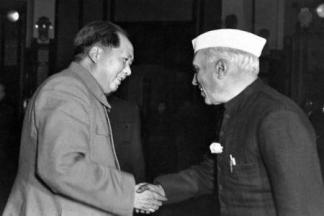
“China has many people. They cannot be bombed out of existence. If someone else can drop an atomic bomb, I can too. The death of ten or twenty million people is nothing to be afraid of,” Mao tells a shocked Nehru.
On 25 November 1950, the 300,000 men of the Chinese Army attacked the Americans in North Korea. Carrying off one of the biggest surprise attacks in the history of warfare, the Chinese action shook the entire world. But in New Delhi, Jawaharlal Nehru was more frustrated than shocked. He had been warning the Americans for weeks that this would happen, but Washington had ignored him. And now world’s most powerful nation was at war with the world’s biggest country. On one side was the US, threatening to use the atomic bomb. On the other side was Chinese dictator Mao, saying that a few nuclear weapons were hardly going to make a dent in the vast Chinese population. It was a nightmare scenario; the whole world could be swallowed by Third World War at any moment. Stuck in the middle of it all, Nehru commented “the world is determined to commit suicide”
The Korean War was perhaps one of most dangerous moments of the Cold War, fuelled by ideological conflict, geopolitical jealousies and general stupidity. At the end of Second World War in 1945, like the world, Korea was divided by the Soviet Union and the United States into two countries- one communist and one democratic. However, desire of a united Korea persisted, particularly in the mind of North Korean dictator Kim Il-Sung (grandfather of the current North Korean dictator). On 25 June 1950, North Korea invaded South Korea, causing the United States to immediately jump in the war, dispatching troops under the banner of United Nations.
